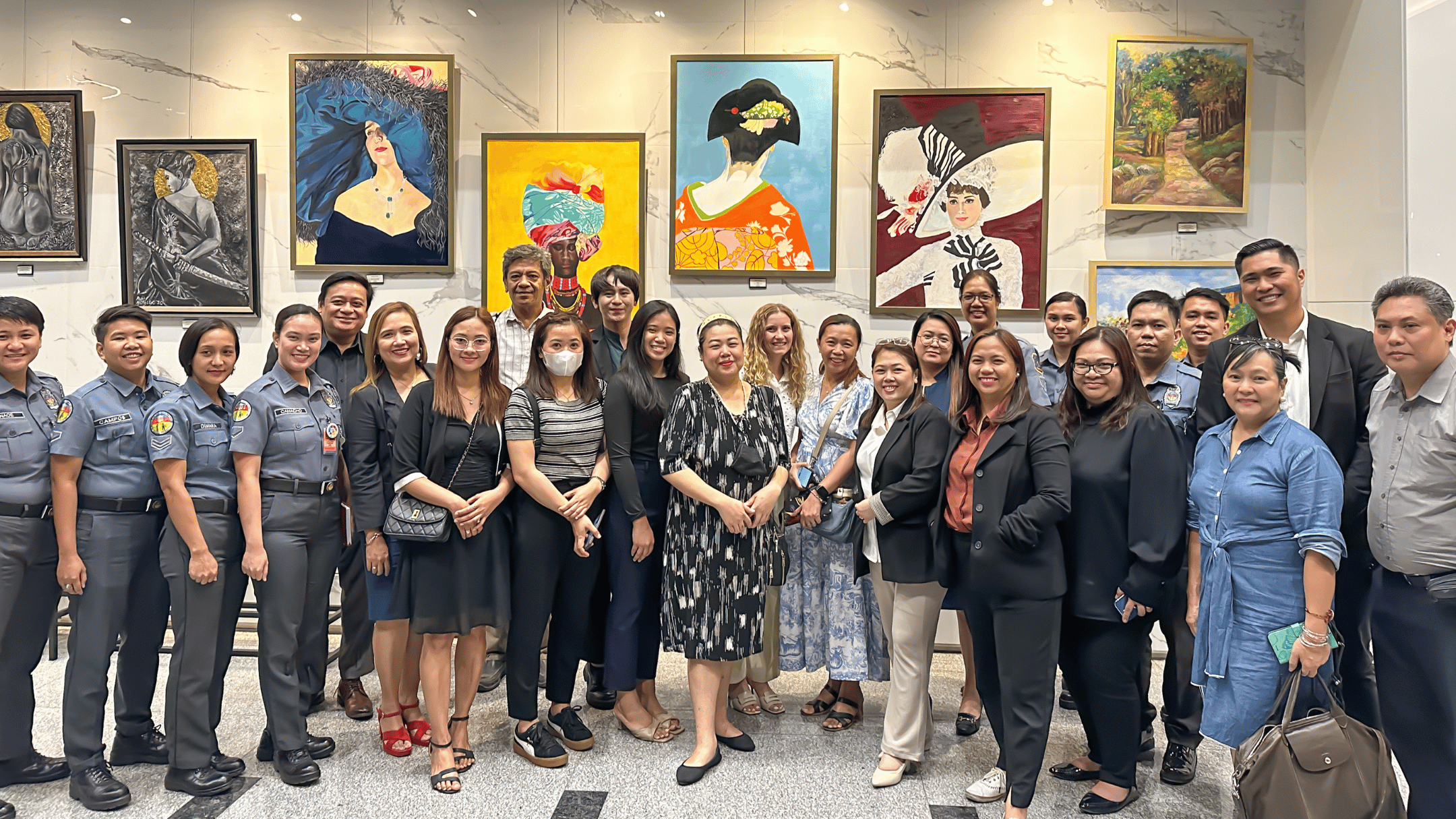"Everything is connected. We are all connected." —Statement from the Sustainability Committee Meeting for March

On 20 March 2024, the Nordic Chamber of Commerce of the Philippines hosted the Sustainability Committee Meeting at KMC Armstrong Cafe, Makati City, with a focus on Prioritizing Health & Nutrition at the Workplace.
The speakers invited for this month's discussion included Dr. Christian Angelo Lubaton, Medical Director at Nordic Medical Clinic; Freja Mengel, Director of People & Organization at Novo Nordisk Pharmaceuticals (Phils.) Inc; and Dr. Maria Julia Golloso-Gubat, Senior Science Research Specialist at the Department of Science and Technology – Food and Nutrition Research Institute (DOST-FNRI).
Various representatives from different companies and organizations attended the event, namely: Antrak Logistics, BDO Unibank Inc., CGI Philippines, Department of Science and Technology – Food and Nutrition Research Institute (DOST-FNRI), Maccess Corporation, Nordic Medical Clinics, Novo Nordisk Pharmaceuticals (Phils.) Inc., Odfjell Technology Philippines Corporation, OSM Maritime Group, Pinoy Aksyon News, Q2 HR Solutions Inc., Teresa Marble Corp., and TodayPh.
A Holistic Approach to Workplace Wellness
The discussion began with a talk from Dr. Christian Angelo Lubaton, Medical Director at Nordic Medical Clinic, emphasizing the importance of holistic well-being for each employee. As Dr. Lubaton pointed out, "Everything is connected. We are all connected." He highlighted that being healthy doesn't solely imply the absence of diseases but encompasses a complete state of mental, physical, and social well-being. He pointed out that the interconnectedness between employee health and business performance is crucial. When employees are healthy, it positively impacts team dynamics, productivity, and overall workplace morale.
Regarding prioritizing health and nutrition at work, he outlined four main points: the need for self-examination of health, regular health talks for employees to educate them, encouragement for companies to establish and implement programs supporting employee well-being, and empowerment through mentoring sessions. Dr. Lubaton stressed that these four points should be prioritized by companies to ensure a healthy workplace.
As an example, Dr. Lubaton showcased efforts implemented in their company to support employee health and well-being, such as providing healthy lunches and snacks, offering holistic annual check-ups and diagnostics to identify current and pre-existing health conditions among employees, and emphasizing the importance of access to doctors, either through clinics or telemedicine, which many employees consider vital. He believed that these simple yet effective initiatives not only support employees but also enhance work performance.
To conclude his presentation, he challenged every business leader and employee at the event to set a prime example by adopting healthy practices and initiatives to cultivate a healthy workplace.
Healthy Employees, Healthy Business: Key to Sustainable Success
In the second discussion, Freja Mengel, Director of People & Organization at Novo Nordisk Pharmaceuticals (Phils.) Inc., guided participants through a wealth of insights drawn from her extensive experience as an HR Business Partner.
A key highlight of her talk centered around the significance of prioritizing a healthy and engaging work environment, illustrating it as a prime example of good business practice. Freja emphasized that employees who are disengaged at work represent an untapped productivity opportunity of $8.8 trillion globally, contrasting with businesses that cultivate a positive workplace environment, resulting in employees who are three times more engaged with work tasks resulting in a more enhanced business performance.
Drawing from her experience as a people and organization director, Freja underscored that establishing a great and healthy workplace starts with fostering a proactive and healthy organizational culture. She emphasized that at Novo Nordisk, they place paramount importance on three key areas for employee well-being. Firstly, they prioritize the psychosocial work environment, emphasizing mental health, including emotional, psychological, and social well-being. Secondly, they create awareness around health and lead by example through company initiatives and programs. Lastly, they prioritize benefit and allowance policies, ensuring a competitive policy supporting a healthy lifestyle.
Freja also stressed the significance of promoting healthy lifestyle choices through comprehensive benefit policies across all employees, encompassing competitive insurance schemes, medical allowances, medical leaves, maternity and paternity policies, among others.
In concluding her presentation, Freja highlighted to the participants that as corporate leaders or managers, a well-designed psychosocial work environment is essential for performance and serves as a significant protective factor for mental health. She firmly believes that prioritizing a healthy workplace is directly linked to both business and employee performance and wants to impart this to the attendees for application in their own workplace.
Government's Perspective on Improving Employee Well-being
Providing insight from the government sector, Dr. Maria Julia Golloso-Gubat, Senior Science Research Specialist at the Department of Science and Technology – Food and Nutrition Research Institute (DOST-FNRI), delved into the #GoforHealthierDOST program, a model for wellness initiatives in government workplaces, and shared perspectives on the government's efforts to foster employee health and engagement.
In summary, the #GoforHealthierDOST program by DOST-FNRI aims to engage various DOST agencies in establishing institutional wellness programs, raising awareness about wellness among employees in these agencies, monitoring the anthropometric profile of participating DOST employees, and developing a database on the health and nutrition profiles of participating personnel to be used as a research foundation to improve employee wellbeing in the government sector.
Dr. Galloso-Gubat provided a detailed overview of the program's four primary elements. Firstly, the initiative involves conducting Nutritional Assessment & Counseling sessions, where employees undergo evaluations of their dietary habits and receive guidance on making healthier food choices. Secondly, the program includes a Health & Nutrition Lecture Series, during which experts educate participants on various aspects of health and nutrition, empowering them with knowledge to make informed decisions about their well-being.
Third is the inclusion of Physical Activity Sessions that is deemed an integral part of the program, offering employees opportunities to engage in diverse exercises such as zumba, yoga, walking, and jogging, aimed at promoting physical fitness and overall health. Lastly, the proactive integration of Sports & Fitness programs for employees ensures that structured sporting activities and fitness regimes are incorporated into the workplace culture, encouraging regular exercise participation and fostering a culture of wellness among employees.
In conclusion, Dr. Galloso-Gubat underscored the pivotal role of management support in the effectiveness of workplace wellness initiatives, particularly within government agencies. Drawing from their research, she highlighted the importance of ongoing employee engagement and support for health programs, alongside the notable impact of personalized counseling in promoting wellness. Furthermore, she emphasized the value of implementing strategic marketing strategies to boost participation and commitment to these programs. These insights serve as a key factor contributing to the success of workplace wellness efforts, showing the importance of holistic support and targeted strategies in fostering employee well-being of government employees.
After the presentation concluded, the speakers interacted with the attendees during a Q&A session. Subsequently, the participants engaged in a facilitated brainstorming activity, jotting down their key takeaways in response to the question: “What do you plan to do when you get back to our workplace to somehow promote a more holistic approach to health and nutrition that is not yet being practiced in your company?”
Below are some key takeaways:
- Recommend promoting healthier food alternatives and choices among employees, such as salads, fish, and vegetables.
- Advocate for mental health wellness programs and initiatives actively.
- Encourage companies to endorse active transportation options for commuting to work, such as bicycles.
- Regularly assess employees' health through open discussions or surveys.
- Serve as a role model to employees by advocating for sustainability practices in the workplace.
- Offer health and wellness programs with incentives to encourage active participation.
ABOUT THE EVENT
The NordCham Sustainability Committee aims for more collaboration across industries and learning opportunities from experts in the field of sustainability. Since April 2022, the Sustainability Committee has hosted 21 meetings on varying sustainability topics with resource speakers and sharing of best practices, networking opportunities and partnerships, and collaboration with government units.
The next Sustainability Committee meeting will be held on April 24, 2024, from 3:30 PM to 6:00 PM at Spaces - Manila, World Plaza, Bonifacio Global City. Stay tuned to our website and social media postings for more information.
